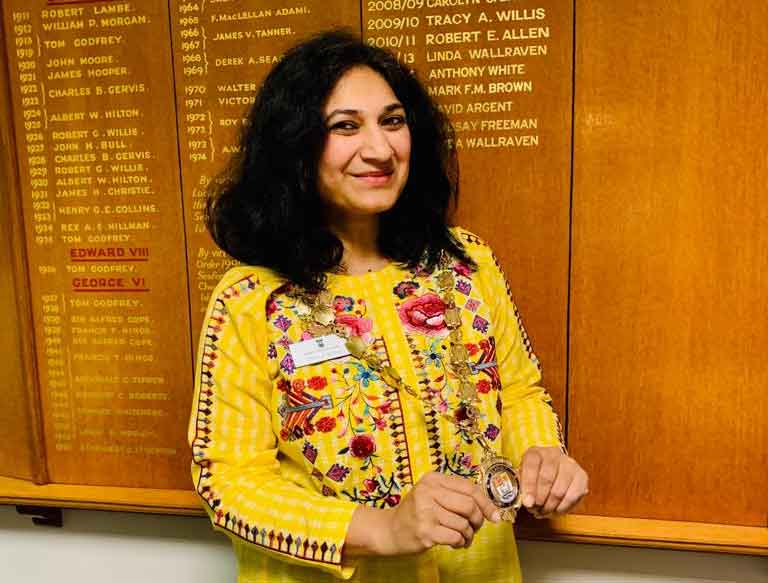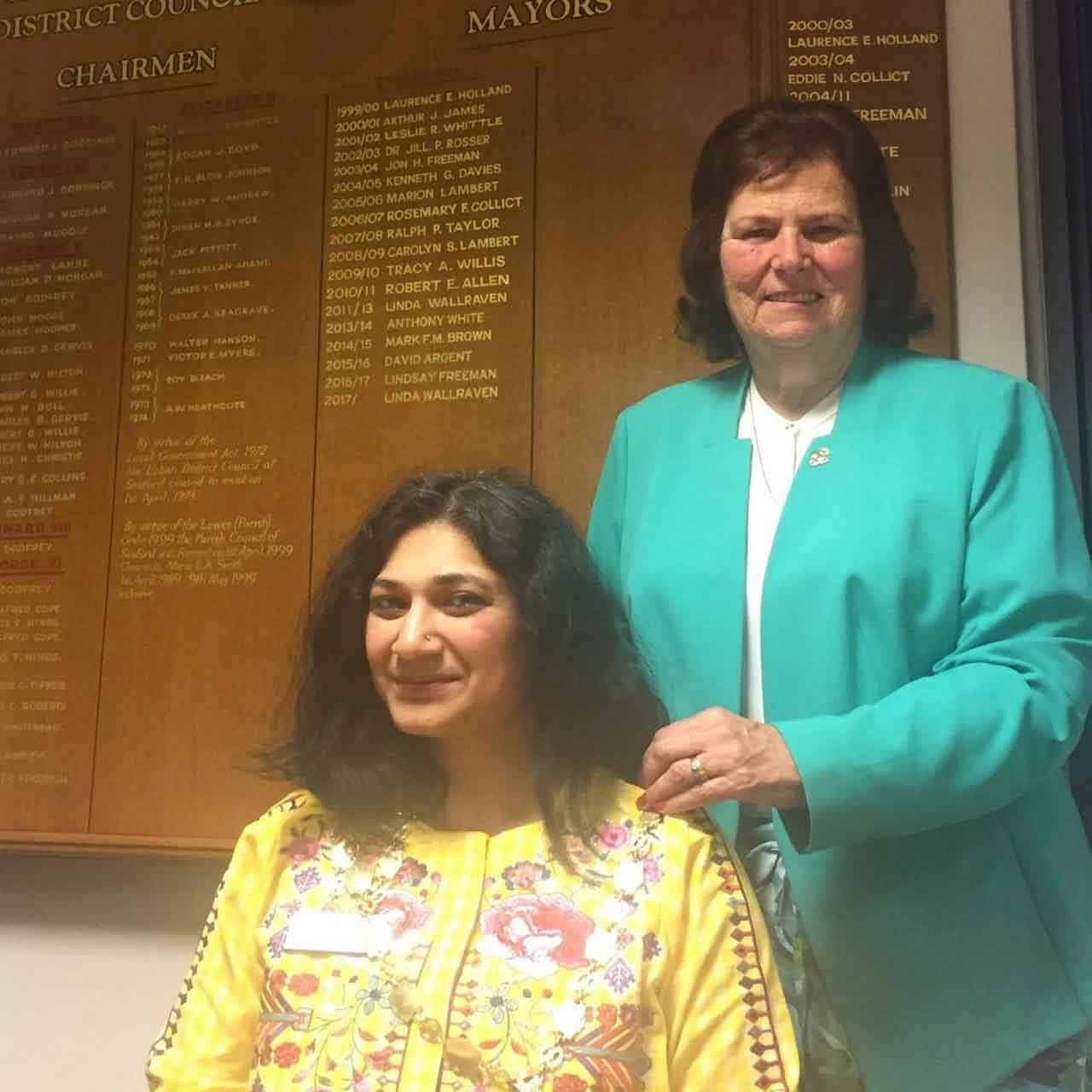Karachi-born mayor of a British town enjoys more powers than Karachi mayor
Nazish Adil, 40, who is also known as 'Pinky' in Seaford, became the town’s first mayor belonging to an ethnic minority in just less than nine years of her stay in the UK after she shifted there from Karachi.
The ‘wave of change’ which struck Pakistani politics in the 2018 general elections was, to a smaller extent, also experienced this year in Seaford, a coastal town of the United Kingdom (UK).
In the local government elections, the people of Seaford brought into power a third political force, the Liberal Democrats, which defeated the country’s two major political parties – the Conservative Party and the Labour Party.
But this story is not about the Liberal Democrats. It is about the Seaford mayor who was nominated by the party after it won most of the seats in the town council of Seaford. The mayor was a woman born and educated in Karachi.
Nazish Adil, 40, who is also known as 'Pinky' in Seaford, became the town’s first mayor belonging to an ethnic minority in just less than nine years of her stay in the UK after she shifted there from Karachi.
It was not an easy election for Adil as she clinched that seat of the town council of Seaford that was known to have a large number of staunch supporters of the Conservative party. She now wears the mayor’s gown and the town’s sacred chain and she, being the town’s representative, enjoys to be the ceremonial head of the town.
From Karachi to Seaford
The News had the opportunity to have a detailed discussion with Adil when she recently paid a visit to Karachi. Clad in a peach-coloured kameez and white shalwar in her well-furnished home in Gulshan-e-Iqbal 13-D, she informed The News about her early life in Pakistan, her life in the UK and her political career.
Adil was born in Karachi and acquired her entire education here. She completed her LLB from the SM Law College and then did her masters in international relations from the University of Karachi. Later, she completed LLM in criminology from the SM Law College. She conveniently shared how she appeared for the CSS examinations but could not get through.
She was also married in Karachi. Her husband was a banker in Pakistan who shifted to the UK as he was not quite enjoying his job here. It was in 2010 when she moved to the UK with her husband. Initially, they stayed in a town, Peace Haven, for one-and-a-half year, after which they settled in Seaford, which is a town of the Lewes District Council of Brighton city. She now lives in the town with her husband and two sons who are 12 and nine years old.
It was May 2, this year, when she won the local elections and on May 16, she was elected as the mayor of Seaford. She proudly states that the credit of her success goes to Pakistan. In Seaford, her husband works in securities while she manages a restaurant of Indian cuisine, Moon of India, the first Indian restaurant in the town that is owned by a Bengali family.
According to Adil, besides her family, there are no Asians in the town except three Bengali families who run Indian restaurants there.
“Where I live, it’s totally English,” she said, adding that very few ethnic minorities live in Seaford and almost all the people are Christians. One of the reasons of her success in the elections, she says, is the prime minister of Pakistan, Imran Khan, who used to play cricket from East Sussex, the county where her town lies. Counties in the UK are more or less equivalent to Pakistani provinces.
“He’s really popular in the area. When people see me there, first thing they say, oh we know Imran Khan!” she said in a British accent.
Political career
Adil started her career with the Liberal Democrats, which she thinks is an emerging party of the UK because of being anti-Brexit. She believes that the Liberal Democrats is similar to the Pakistan Tehreek-e-Insaaf, which emerged as a third major political force in Pakistan where the national politics was traditionally dominated by only two political parties.
She says there is a “very very big difference” between how the politics is practised in Pakistan and the UK. “They count you as an individual. They do polish the characteristics and qualities that you have as a leader. You have to be a trendsetter there. Mostly they work with populism and charismatic leaders who can communicate easily,” she explained.
Adil made history not in Seaford but in the entire south-east England by becoming the first mayor of Pakistani origin. “There was a big hype in the news and people wanted to give me a chance. It’s like a wave of change.”
She maintained that she did not face any hurdle in the elections for being a Muslim, a Pakistani or a female. The town of Seaford has five wards namely Central, East, West, North and South. Each of the ward elects four town councillors who are members of the town council. Thus, the town council comprises a total of 20 councillors, who elect the mayor and the deputy mayor among themselves.
“While I was campaigning, few of my friends told me not to keep hopes very high because my ward wasn’t of Liberal Democrats,” she said. Later, it turned out that her leadership skills and somewhat aggressive attitude in politics, helped her win the election.
In England, she says, most people are politically correct and polite but they try not to be proactive and aggressive even when the situation demands it. “A few of the issues which really need the voice, they just try to shift the burden [to someone else],” she said in a casual tone and added that people of her ward wanted someone who was politically aggressive and had wisdom regarding what to say, how to say and when to say, and they found those traits in her, which she had learnt during her life in Pakistan.
Local government structure
Explaining the political structure of local governments in the UK, she said there were three tiers of local government there. They have a council for every county, which is similar to a province here in Pakistan, she said, adding that the county of Seaford was East Sussex. After counties, districts serve as another tier of the local government. She explained the Seaford lied in Lewes District Council.
Below the district councils comes the tier of town councils. Adil is the elected mayor of the town council of Seaford. Seaford is one of the biggest towns of Lewes district with a population of over 28,000. “So I am a mayor over 28,000 people,” she said, adding that the territorial limits of the town councils in the UK are decided on the basis of population.
Sharing details about her town council, she said they had 20 members in the council, of which two were Bengalis. In the local government elections, her party became the largest party in the council after securing nine seats. The Conservative party clinched eight seats while a single seat was secured by an independent candidate, the Labour Party and the Green Liberal Party.
Adil said after the elections, her party initially pondered over letting the Conservative party elect their mayor, however, she was able to convince her party to elect their own mayor and played a significant role in forming a coalition with other parties in the council.
She was elected the mayor after an in-house election, in which she received 12 votes and the candidate of the Conservative Party polled five votes. The mayor of the council has to be re-elected after every year, while the council is elected for a four-year term.
However, once somebody is elected as the mayor, they are supposed to be apolitical onwards. “Once I stepped as a mayor, I did not have anything to do with the [political] campaigns or promotions or anything for my party,” she said.
Council’s functions
The council has all the powers which the Karachi mayor craves for. They have powers over garbage collection, sewerage system, water supply, parking and several other civic issues. One of the significant issues which the council has to deal with is the management of dogs’ poo.
The town council can also address issues like child abuse and bullying in schools. “We can make liaison with schools, and do projects together by funding projects or campaigns,” she said.
As for the finances, she said the town council generates income through taxes but they also get grants from the county. “Every district or county or town has its own grant,” she said and added that the grant never went in any individual’s hand as they had several committees such as the finance committee, the committee on community that dealt with social issues, the planning and highway committee and the neighbourhood watch committee for the safety that were all under the district council and the mayor of the town, unlike Karachi where most of these functions are under the provincial government.
If any development work is to be carried out in the town, its proposal has to be moved by the respective committee to the town council.
“For any construction project, the county or the district has to seek approval from the town council. If the council opposes it, it will return the proposal with its reasons and also the alternatives. The proposal will keep moving back and forth until the town approves it,” she said.
Even if a resident wants to convert his or her garden into a concrete floor, they will have to seek the town council’s permission and the same goes for any commercial project, she said.
When asked about whether there were delaying tactics in the UK which were often witnessed in Pakistan when two rival political parties were at the helm of affairs in different tiers of governments, she laughed and remarked that it did not work like that there.
However, she later admitted that sometimes such political tactics were witnessed in their system as well.
Comments on Karachi
In Pakistan, she said, the British law was still followed and the municipal system had also been derived from the British system. After meeting Karachi Mayor Wasim Akhtar, Adil said she was in a state of shock when she came to know that he did not even have the function of garbage collection with him.
“Comparing these two systems, I saw the [Karachi] mayor did not have any powers. And people are complaining to the mayor for not taking care of garbage which is one of the biggest issues here,” she said.
“I wanted to learn [from the Karachi’s local government] as it’s my new journey. But now I think we are more experienced and more learned … we are far more powerful than the mayor Karachi,” she said.
During their meeting, both the mayors also suggested to exchange the keys of their respective cities and declare Seaford and Karachi sister cities.
-
 James Van Der Beek's Final Conversation With Director Roger Avary Laid Bare: 'We Cried'
James Van Der Beek's Final Conversation With Director Roger Avary Laid Bare: 'We Cried' -
 Jaden Smith Walks Out Of Interview After Kanye West Question At Film Premiere
Jaden Smith Walks Out Of Interview After Kanye West Question At Film Premiere -
 Michelle Obama Gets Candid About Spontaneous Decision At Piercings Tattoo
Michelle Obama Gets Candid About Spontaneous Decision At Piercings Tattoo -
 Why Halle Berry Wasn't Ready For Marriage After Van Hunt Popped Question? Source
Why Halle Berry Wasn't Ready For Marriage After Van Hunt Popped Question? Source -
 Bunnie Xo Shares Raw Confession After Year-long IVF Struggle
Bunnie Xo Shares Raw Confession After Year-long IVF Struggle -
 Brooks Nader Reveals Why She Quit Fillers After Years
Brooks Nader Reveals Why She Quit Fillers After Years -
 Travis Kelce Plays Key Role In Taylor Swift's 'Opalite' Remix
Travis Kelce Plays Key Role In Taylor Swift's 'Opalite' Remix -
 How Jennifer Aniston's 57th Birthday Went With Boyfriend Jim Curtis
How Jennifer Aniston's 57th Birthday Went With Boyfriend Jim Curtis -
 JoJo Siwa Shares Inspiring Words With Young Changemakers
JoJo Siwa Shares Inspiring Words With Young Changemakers -
 James Van Der Beek Loved Ones Breaks Silence After Fundraiser Hits $2.2M
James Van Der Beek Loved Ones Breaks Silence After Fundraiser Hits $2.2M -
 Disney’s $336m 'Snow White' Remake Ends With $170m Box Office Loss: Report
Disney’s $336m 'Snow White' Remake Ends With $170m Box Office Loss: Report -
 Travis Kelce's Mom Donna Kelce Breaks Silence On His Retirement Plans
Travis Kelce's Mom Donna Kelce Breaks Silence On His Retirement Plans -
 Premiere Date Of 'Spider-Noir' Featuring Nicolas Cage Announced
Premiere Date Of 'Spider-Noir' Featuring Nicolas Cage Announced -
 Pedro Pascal's Sister Reveals His Reaction To Her 'The Beauty' Role
Pedro Pascal's Sister Reveals His Reaction To Her 'The Beauty' Role -
 Kate Middleton Proves She's True 'children's Princess' With THIS Move
Kate Middleton Proves She's True 'children's Princess' With THIS Move -
 Paul Anka Reveals How He Raised Son Ethan Differently From His Daughters
Paul Anka Reveals How He Raised Son Ethan Differently From His Daughters






